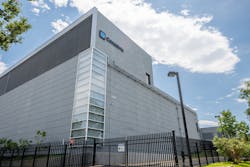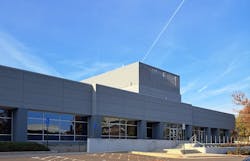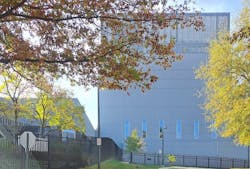DCF Tours: CoreSite Reston Colocation Data Center VA3, Reston, Virginia
CoreSite's Reston Data Center VA3 is located at 12369 Sunrise Valley Drive in Reston, Virginia. There I meet with my tour guides from CoreSite, including: Brouk Eshetu,VP and GM, Mid-Atlantic U.S.; Matt Johns, VP Sales, Mid-Atlantic and Southeast U.S.; Benjamin Lundquist, Director of Sales Engineering; and Bill Winfree, Field Marketing Manager, Eastern U.S.
I will see all four men throughout the following day in the hallways of last November's DCD Virginia event, Datacenter Dynamics' annual conference reflecting the industry's beating heart in NoVA, emanating from Ashburn's famed Data Center Alley and surrounding environs in Loudoun, Fairfax, and Prince William Counties, as well as across the state.
To begin our tour of VA3, in the data center's large conference room, CoreSite's Mid-Atlantic VP and GM, Brouk Eshetu, explained how the operator's presence in the Northern Virginia market is somewhat unique, due to the company's strategy of building enterprise class data centers near carrier hubs:
"This is the big leagues, in the Northern Virginia market. Anybody and everybody has capacity here [with] over five gigawatts of installed capacity from the hyperscalers and pretty much all of the multitenant data center companies. This market is bigger than the next ten U.S. markets combined. But our presence here is a little bit unique. To give you the background and context, CoreSite was founded in 2001 as a collection of carrier hotel assets. We were started by Carlyle Group, where they acquired some of the most interconnected old peering carrier hotels in the largest markets, the famous ones being the One Wilshire building in LA. and 55 South Market in the Silicon Valley area. Then here [in NoVA] we had 1275 K Street, which was the original peering hub for the Washington D.C. market.
That's how we got started. We owned and operated these carrier hotels that had all of the network-to-network peering ecosystems. But as the Internet evolved and matured and new use cases emerged and the world became a lot more digital, we realized these carrier hubs -- basically a couple of floors in a downtown office building that was repurposed to house network routers and servers -- were no longer adequate to support the emerging use cases, and the densities from social media companies, and the Ubers and Googles of the world that required more bandwidth, higher densities, heavier racks, etc.
So we evolved and started what we call our campus strategy, which was to build enterprise-class data centers in very near proximity to all of those carrier hotels and carrier hubs. That's where we started on the West Coast, when we built our LA2 building, a mile and a half up the road from One Wilshire. We started building purposeful data centers and then interconnecting those to provide our customers the best of both worlds, where they have all of the connectivity options, the hundreds of networks that are present in those carrier hubs, but then can tether these enterprise-size facilities to those carrier hubs and provide the scale and the modern facilities that the new use cases require.
That's the genesis of our strategy and that's really what we've been doing in all of our markets. So in Northern Virginia, we had an original acquisition with 1275 K Street in downtown Washington, D.C. Then in 2007, we acquired our first building here, which was 12100 Sunrise Valley Drive, our VA1 building. That was actually the old AOL headquarters before they moved to Ashburn. It was very fiber dense, had a lot of connectivity, was built to Tier 4 standards at the time, and was ideal to convert to a multitenant data center facility.
Then over time, we organically built the network density and then as it matured, the enterprise started joining the ecosystem. Subsequently, when the public cloud became much more ubiquitous in this area - Northern Virginia being really the birthplace of AWS and the public cloud - the cloud became a much more significant player in the ecosystem. And CoreSite really was on the forefront of adding cloud on-ramps, meaning access to the public clouds via direct-connect, natively deployed cloud on-ramps. That was a huge part of our strategy, to have all of the major cloud on-ramps deployed in our campuses natively. In northern Virginia, we're one of only two places where you have the major public cloud on-ramps to Oracle, Microsoft, Amazon and IBM present in our campus. A big differentiator for us is how we build that network to enterprise to cloud ecosystem.
Most companies need diverse nodes and in-region diversity. In 2012, we built our VA2 building on the parking lot of the 12100 Sunrise property. As we started growing, we quickly sold through that; and then in 2016, we bought this campus, the 23-acre VA3 property, which is only just a mile down the street from our VA1 building. We wanted to have the growth capacity be closely located and tethered to that network hub via diverse dark fiber. So instead of following everybody else in Ashburn, we doubled down on our presence in Fairfax County to make sure our customers have the ability to connect to the cloud on-ramps and the networks, etc., that exist in this market for us."
CoreSite VA3 Colocation Data Center: Tour Notes
One of three interconnected data centers in its Northern Virginia campus, CoreSite's Reston VA3 data center has more than 940,000 square feet (SF) and provides AC and DC power circuits for infrastructure including cabinets, cages and private suites (with rooftop space available) for turn-key fit-out serving high-density, compute-intensive requirements.
In a 2023 interview with Virginia's Fairfax County Economic Development Authority, describing his company's data center campus including VA3 in Fairfax County, CoreSite's President and CEO, Juan Font, said:
"This data center campus comprises about 1.3 million square feet of capacity. Between VA1, VA2, and VA3, we have built 40 megawatts, making us the largest data center provider in Fairfax County. At full build, VA3 will become a 100 megawatts campus. We have invested over half a billion dollars of infrastructure here, have access to over 65 networks, whether it is metro fiber providers, global carriers and even subsea cables that have direct access to the major cloud on ramps. These are the gateways that connect enterprises to the cloud, and that includes Amazon Web Services, Microsoft Azure, Google Compute, Oracle, and IBM."
CoreSite's Eshetu added, "In Ashburn, there's massive buildings, 500 megawatt campuses primarily catered toward hyperscale use cases; a lot of times it'll be a single tenant and they'll lease the entire building. Our strategy is very different. We're focused on smaller retail and scale, density of customers and enterprise and digital content use cases. We typically do anything from single cabinets to megawatt plus, but we're much more focused on ecosystem and adding customers."
Featuring access to a robust ecosystem of cloud, network and IT providers, VA3 is tethered via dark fiber to its co-facilities VA1 and VA2, as well to CoreSite's Washington, D.C. facilities, allowing customers to easily establish interconnections and effectively deploy hybrid IT workloads.
With a floor load capacity able to support up to 5,000 lbs per cabinet and a freight elevator supporting 10,000 lbs, for cooling VA3 supports CRAH units with variable speed fans, an integrated humidification system, air-side economization, and ALC environmental control programming. 1,500-ton magnetic bearing chillers, configured in N+2 with a 4,500-ton plate frame heat exchanger for free cooling, guarantee efficiency.
For onsite water resources, VA3 also includes a 120,000 gallon rainwater harvesting tank, with a 260,000 gallon main tank, and two public utility water sources.
"We collect all the water from the roofs, and then it pours into this 120,000 gallon tank that gets filtered clean, and then dumped over to a 260,000 gallon well that we actually cool the building with," explained CoreSite's VP of Sales, Matt Johns. "So a lot of our water is being sourced from rain."
With power utilities provided by Dominion Energy and N+2 redundancy for generators, electrical highlights of VA3 include a 2N and 4-to-make-3 UPS system with a maintenance UPS and true 2N electrical distribution at PDU and RPP levels. The facility's mechanical support includes the N+2 CRAHs and chillers, as well as cooling towers and multiple plate frame heat exchangers for free cooling.
With a Lutron Eco-System lighting control for LED lighting, VA3's compliance certifications include SOC 1 Type 2, SOC 2 Type 2, ISO 27001, NIST 800-53, PCI DSS, and HIPAA. For monitoring, VA3 also incorporates RF Code readers for pin-point accuracy of temperature and humidity within customer deployments.
On the tour of VA3, I ask CoreSite's Director of Sales Engineering, Benjamin Lundquist, about the company's present stance on matters of AI and liquid cooling. In terms of AI, he said, "We're seeing a lot of different requests, RFPs and such. Right now, the densities and the challenges that come with liquid cooled machines, NVIDIA chipsets and things like that, that's definitely starting to come through. A lot of it is kind of speculative; people are reaching out, figuring out how they're going to do these things."
Regarding CoreSite's position in the arena of data center liquid cooling, Lundquist offered, "We did have a significant liquid cooled deployment here in Virginia and down in Orlando. We currently have one up in New York; I believe Chicago is going to be one of the next ones. Our engineering team is very familiar with providing the chilled water taps from our chilled water system, so we're constantly engaging with customers on liquid cooling solutions."
When asked what rack densities VA3 can accomodate, CoreSite's Lundquist told DCF, "It depends on the solution. Basically we could do anything from about 0 to about 35 to 40 kW, air cooled, and from about 30 to 60 or 70 kW, liquid cooled."
Post-Tour Notes
At the time of our tour in early November, CoreSite, a subsidiary of American Tower Corporation (NYSE: AMT) since 2021, had just announced its alliance with Astound Business Solutions, a nationwide provider of high-capacity and secure connectivity for business customers, along with Astound Broadband, one of the nation's largest residential ISPs, to leverage CoreSite’s hybrid IT infrastructure.
Astound Business Solutions is deploying its network into multiple CoreSite data center campuses in strategic markets including Boston, Chicago, Washington D.C., Los Angeles and Silicon Valley. The integration with CoreSite’s hybrid IT infrastructure enables Astound’s new and existing business customers to have direct access to native cloud onramps to leading public cloud providers, as well as high-performance, dedicated connectivity to networks and partners within CoreSite’s data centers. In turn, CoreSite customers gain access to more than 40,000 fiber route miles across Astound’s nationwide fiber network.
“Adding Astound to key CoreSite data center campuses across the U.S. benefits Astound’s customers through enhanced connectivity and cloud access, while our customers benefit from having Astound’s strong nationwide fiber network available to them,” said CoreSite's CEO Font, who is also SVP of U.S. Tower.
A month later in December, the data center operator would announce new accelerated multicloud networking connections of up to 50 gigabits per second (Gbps) through Oracle Cloud Infrastructure FastConnect on the Open Cloud Exchange (OCX), CoreSite’s software-defined networking platform, the better for enabling AI and ML applications at the network edge.
Finally last December, CoreSite would announce major expansions in its New York and Denver data center campuses, with new facilities to add 685,000 SF to the operator's national footprint to meet rapidly growing capacity and power demands.
CoreSite’s latest New York campus data center – known as NY3 – received final permitting to complete construction of the 85,000-SF facility and 15 critical megawatts (CMW) of capacity. CoreSite also received conceptual approval for a three-building data center campus development of approximately 600,000 SF and 60 CMW of capacity in the Denver market.
More DCF Tours:
- Iron Mountain BOS-1, Northborough, MA
- Flexential Dallas-Plano Data Center, 18 MW Colocation Facility
- NTT Global Data Centers Americas' Dallas TX1, Garland, Texas
- CyrusOne Dallas DFW3 Data Center, Allen, Texas
Keep pace with the fast-moving world of data centers and cloud computing by connecting with Data Center Frontier on LinkedIn, following us on X/Twitter and Facebook, and signing up for our weekly newsletters using the form below.
About the Author
Matt Vincent
A B2B technology journalist and editor with more than two decades of experience, Matt Vincent is Editor in Chief of Data Center Frontier.





